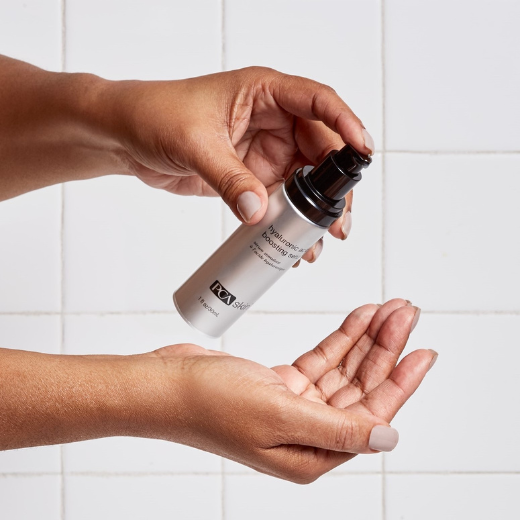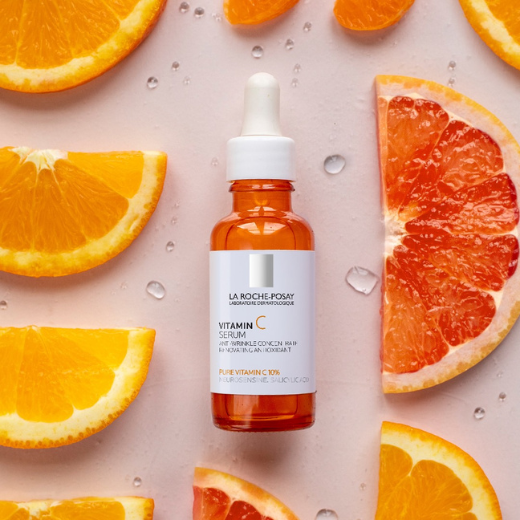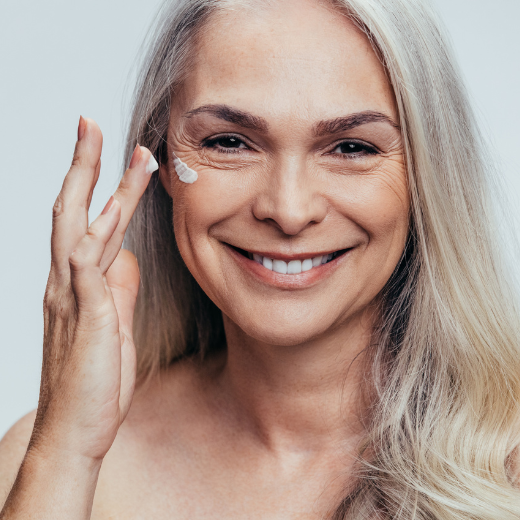The Best Ingredients for Aging Skin
Posted by Ellie Swain on Dec 22nd 2023
Let's face it - aging is a natural process we can't completely escape. However, we can definitely make the journey a bit smoother with the right skincare choices.
We’re here to help you with that. Today, let’s explore the best ingredients for aging skin.
Retinoids
The skincare world has been raving about retinoids for years, and for good reason. These vitamin A derivatives stimulate collagen production and speed up cell turnover, helping to reduce the appearance of fine lines, wrinkles, and age spots.
When applying a retinoid cream or serum, start slow to avoid skin irritation. Begin with a lower concentration and work up as your skin gets used to it. Many brands offer different strengths of retinoids, so you can tailor your regimen. And oh, please remember to wear sunscreen in the daytime, as retinoids can make your skin more sensitive to UV radiation.

Hyaluronic Acid
Meet hyaluronic acid, a naturally occurring substance in our skin that holds water like a sponge, keeping your complexion moisturized. We lose some of this natural hydrator as we age, leading to drier, less elastic skin. Adding a hyaluronic acid serum or cream to your routine can help replenish lost moisture, making your skin look plumper and more youthful.
For that extra hydration boost, try layering a hyaluronic acid serum under your regular moisturizer. Providing deep, long-lasting hydration on three levels, the PCA Skin Hyaluronic Acid Boosting Serum is an excellent option.
Vitamin C
Vitamin C isn't just for warding off colds. It's a powerhouse for your skin, too. It can help brighten your complexion, even out skin tone, and reduce signs of aging.
Vitamin C is an antioxidant that neutralizes free radicals that can damage skin cells. Look for a vitamin C serum with at least 10% concentration for the best results. There are many options, but we recommend the La Roche-Posay Vitamin C Serum for impressive results.
And remember, vitamin C is sensitive to light and air, so make sure your serum comes in an airtight bottle and always store it in a safe and dry spot.

Peptides
Peptides are short chains of amino acids that act as building blocks for proteins like collagen, elastin, and keratin. These proteins are essential for maintaining the structure and firmness of your skin. Peptides can help signal your skin to produce more collagen, making them a great ingredient for aging skin.
You'll find peptides in various skincare products, from eye creams to serums. Combine peptides with other anti-aging ingredients like retinoids or hyaluronic acid for a multi-faceted approach to skincare.
Niacinamide
Niacinamide, also known as vitamin B3, is the jack-of-all-trades when it comes to skincare. It's especially wonderful for aging skin, offering a range of benefits, from improving skin barrier function to reducing redness and blotchiness. Plus, niacinamide works well with other anti-aging ingredients, making it a great addition to your skincare regime.
Niacinamide has been shown to reduce the appearance of fine lines and pores while boosting hydration. Niacinamide is generally well-tolerated, but introducing any new ingredient gradually is always a good idea. Start by using niacinamide every other day and observe how your skin reacts before making it a daily staple.
Ceramides
Think of ceramides as the mortar between the bricks (your skin cells) that keep everything intact. As we age, our level of ceramides naturally starts to decrease, leading to a compromised skin barrier, dryness, and wrinkles.
Adding a moisturizer or serum rich in ceramides can help replenish this loss, keeping your skin hydrated and resilient against environmental aggressors like pollution and wind.
Ceramides work exceptionally well with other moisturizing agents like hyaluronic acid and fatty acids. Look for products that include these combinations for an all-round moisture-locking effect.
Sunscreen
Last but definitely not least - sunscreen. Sunscreen may not sound as exotic as the other ingredients, but it's hands-down the best anti-aging product you can use.
Daily exposure to UV rays accelerates aging, so please don't skip applying sunscreen, even on cloudy days or during the cold winter months. Look for a broad-spectrum sunscreen with at least SPF 30. Be sure to reapply every two hours if you're out and about and immediately after swimming or breaking out a sweat.
Remember, the most effective anti-aging routine is one you'll stick to. Feel free to play with these ingredients to see what works best. And always do a patch test when introducing a new product to ensure it's suitable for your skin. Here's to embracing aging gracefully - with a little help from our skincare ingredient friends, of course.
Do you want more skincare advice? Here’s skincare for special occasions.

